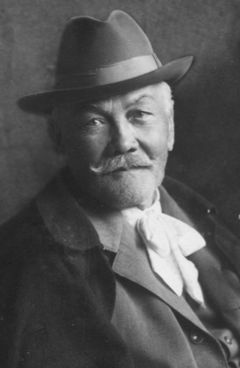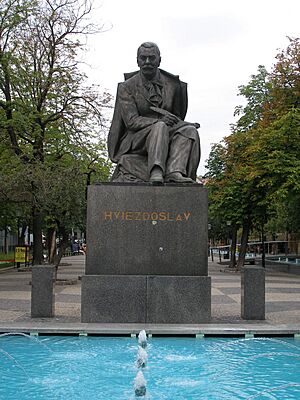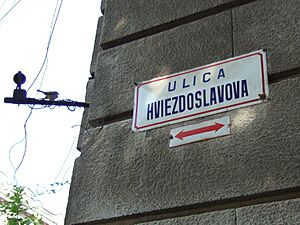Pavol Országh Hviezdoslav facts for kids
Quick facts for kids
Pavol Országh Hviezdoslav
|
|
|---|---|

Pavol Országh Hviezdoslav
|
|
| Born | Pavel Országh 2 February 1849 Felsőkubin (now Vyšný Kubín, Slovakia) |
| Died | 8 November 1921 (aged 72) Dolný Kubín, Czechoslovakia |
| Resting place | Cemetery in Dolný Kubín |
| Pen name | Pavol Országh Hviezdoslav, Jozef Zbranský |
| Occupation | poet, dramatist, translator |
| Language | Slovak, Hungarian |
| Nationality | Slovak |
| Spouse | Ilona Országhová |
Pavol Országh Hviezdoslav (born February 2, 1849 – died November 8, 1921) was a very important Slovak poet, playwright, and translator. For a short time, he was also a member of the Czechoslovak parliament. He started writing in a traditional style. Later, he was influenced by newer literary styles like Parnassianism and modernism, which focused on art for art's sake and new ways of expressing ideas.
Contents
His Name
He was born as Pavol Országh. His family name, Országh, comes from Hungarian and means "country."
Hviezdoslav was his pen name, or pseudonym, which he started using in 1875. This Slavic name means something like "celebrating the stars" or "Slav of the stars." Before that, he used the pen name Jozef Zbranský.
His Life
Pavol Országh was born in Felsőkubin, which is now Vyšný Kubín in Slovakia. His family was from a noble background.
He went to grammar schools in Miskolc and Késmárk (now Kežmarok, Slovakia). During his school years, he became familiar with the poems of famous Hungarian writers. He even started writing poems in Hungarian at first.
After 1870, he decided to write in Slovak. He continued his studies at the Law Academy in Eperjes (now Prešov, Slovakia). In 1871, he helped create an important collection of writings called Almanach Napred ("Forward" Miscellany). This collection was a big step for a new generation of Slovak writers.
Because of some of his bold poems in the Almanac, he found it hard to get his works published for several years. During this time, he worked as a lawyer in Alsókubin (now Dolný Kubín, Slovakia) and later in Námesztó. Even though he was busy with his law career, he kept writing in his free time.
In 1918, after Czechoslovakia was formed, Hviezdoslav became a member of the new parliament in Prague. From 1919 to 1920, he served as a representative there. In 1919, he was also chosen to lead the re-established Matica slovenská. This was an important Slovak cultural organization that had been closed down earlier.
Today, there is a museum dedicated to him in Dolný Kubín, called the Literary Museum of P. O. Hviezdoslav. A poetry festival called Hviezdoslav's Kubín is held there every year. Even a small planet (number 3980) is named Hviezdoslav in his honor!
His Works
Hviezdoslav brought a new way of writing poetry to Slovak literature. He used a special rhythm called syllabic-tonic verse. He is known as a leading writer of literary realism in Slovakia. This means he wrote about real life and everyday people.
His writing style often included words and phrases he made up himself. This unique style makes his works quite difficult to translate into other languages.
Hviezdoslav wrote a huge amount of poetry, filling about 12 books. He also translated 3 volumes of works by famous authors. During his time, he was considered the most important poet of the Slovak nation.
Important Poems
Hviezdoslav's first collection of poems, Básnické prviesienky Jozefa Zbranského ("Poetry Primroses of Jozef Zbranský"), was published in 1868.
Some of his most important collections of poems include:
- Sonety (1882–1886) – These are sonnets, a type of poem with 14 lines.
- Letorosty I-III (1885–1893) – This title means "Growth Rings."
- Žalmy a hymny (1885–1892) – These are "Psalms and Hymns."
- Prechádzky jarom (1898) – "Walks through Spring."
- Prechádzky letom (1898) – "Walks through Summer."
- Krvavé sonety (1914/1919) – "Bloody Sonnets." These are very important poems that speak out against World War I.
Long Poems and Stories
Many of Hviezdoslav's longer poems and stories were inspired by his home region of Orava. He also used stories from the Bible to comment on the situation of the Slovak nation.
Some of his well-known epic poems include:
- Hájnikova žena (1884–1886) – "The Gamekeeper's Wife."
- Ežo Vlkolinský (1890)
- Gábor Vlkolinský (1897–1899)
He also wrote poems based on biblical stories, such as:
- Agar
- Kain
- Ráchel
- Sen Šalamúnov – "The Dream of Solomon."
Plays
Hviezdoslav also wrote plays. His most famous verse drama is:
- Herodes a Herodias (1909) – "Herod and Herodias." This play was inspired by the Bible and is still a very important part of Slovak theater.
His Translations
Hviezdoslav was also a talented translator. He translated many works by famous authors from around the world.
Some of the authors he translated include:
- Goethe (like Faust)
- Schiller
- Mickiewicz
- Pushkin (like Boris Godunov and The Gypsies)
- Shakespeare (like Hamlet and A Midsummer Night's Dream)
- Arany
- Petőfi
- Lermontov
- Madách (The Tragedy of Man)
His translations were so good that he was even made a member of the Kisfaludy Society in 1912, a Hungarian literary group.
His Legacy
Hviezdoslav's influence is still felt today. Hviezdoslavovo námestie, a famous town square in Bratislava, is named after him. The village of Hviezdoslavov and about 172 streets across Slovakia also bear his name.
The poetry recitation contest Hviezdoslavov Kubín is held every year since 1954. It is named in his honor and celebrates the art of reciting poetry.
See also
- Slovak poetry
 | Frances Mary Albrier |
 | Whitney Young |
 | Muhammad Ali |



